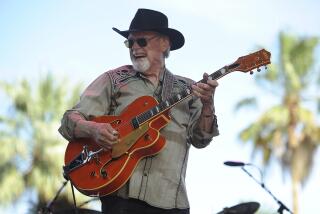Duane Jarvis dies at 51; L.A. roots music singer-songwriter and guitarist
- Share via
Duane Jarvis, a stalwart of the Los Angeles roots music scene whose lead guitar work landed him stints playing with Dwight Yoakam, Lucinda Williams, John Prine, Michelle Shocked and others when he wasn’t recording and touring as a respected singer-songwriter in his own right, died Wednesday after a long bout with colon cancer. He was 51.
Jarvis died at his home in Marina del Rey, where he was receiving hospice care after stopping treatment that in recent months had included two major surgeries and three rounds of chemotherapy, according to Kevin Jarvis, a drummer who performed frequently with his older brother.
“Duane passed away this morning at 1:30 a.m. with a smile on his face,” Kevin Jarvis wrote in an e-mail sent Wednesday to family members and friends. “We knew time was short by the way things were going that day, although Duane surprised us a little by leaving us quite so soon.”
Jarvis’ guitar work was prized by some of the most esteemed practitioners of Americana music for its emotive power, musical economy and sonic atmospherics. As a songwriter with a handful of solo albums to his credit, he often sought out the light in even the darkest life scenarios, which he sang in a laconic, reedy voice that fell between the Southern rock drawl of Tom Petty and the bluesy scowl of Mick Jagger.
“The thing I’ll always carry with me about Duane is that there was something pure in his happiness about music. I always felt he was just a smile away. . . . He’d give me that sideways look like we were getting away with something, that we’d been let loose in the magic sandbox,” Yoakam said Wednesday.
“It’s country rock by way of the British invasion,” Jarvis told the Portland Oregonian in 1994. “Those guys--the Who, the Kinks, the Stones--were listening to American music anyway. I always felt there was a common thread through all that.”
Similarly attuned musicians in Los Angeles drew Jarvis from Oregon, where he’d become a popular club attraction, playing in bands including the Odds, 2 Minutes 50 and Map of France.
“A lot of my favorite music was coming out of there: Rank and File, the Blasters, Lone Justice,” he said. Upon arriving in the midst of L.A.’s early-’80s roots-music explosion, he connected with Lone Justice bassist and songwriter Marvin Etzioni, who tapped Jarvis for a band he was starting.
Lucinda Williams and Dwight Yoakam were habitues of the same scene, and when Yoakam’s partner and lead guitarist Pete Anderson had to bow out of a tour to Australia, Anderson recommended Jarvis to take his place.
He also won the admiration of Williams, and co-wrote “Still I Long For Your Kiss” that appeared on her Grammy-winning album “Car Wheels On a Gravel Road,” which also features Jarvis’ guitar work.
Duane Jarvis was born Aug. 22, 1957, in Astoria, Ore. His family moved around the country often, stopping in the Bay Area, Seattle, Huntington Beach and Florida before settling in Portland.
Jarvis appeared to inherit the family’s wanderlust, putting in time in Los Angeles, Nashville and Austin before returning to Southern California for the last several years. During the ‘80s, he also played as a member of the punk-tinged Divinyls, and in recent years had fronted another band, Los Flacos, while he and Kevin also backed L.A.’s Ben Vaughan.
He led a life common to musicians who ply the indie music scene without finding big commercial success, playing clubs around the country and on occasion in Europe. But Jarvis persevered. “You have to keep painting your paintings,” he said in a 2001 interview, “because eventually you’ll find a gallery somewhere.”
In addition to his brother, Jarvis, who was married and divorced twice and had no children, is survived by his mother, Barbara Jarvis, of Portland and a brother, Brian.
Services are pending.
--
More to Read
The biggest entertainment stories
Get our big stories about Hollywood, film, television, music, arts, culture and more right in your inbox as soon as they publish.
You may occasionally receive promotional content from the Los Angeles Times.









